It's the greatest pub in the world.
But I knew it would be special. I knew while I was planning the trip. Before I even stepped foot in England. I could feel the warmth of the fireplace between the pixels on my computer screen.
We got to The Woolpack in the late afternoon, just as the late November shadows started stretching across the bucolic valley of Slad, a small village in the Cotswolds just outside of Stroud. It's an unsuspecting village - a drive through the small (very small) backroads, and you'd probably mistake it for just yet another pristine Cotswold village. And something tells me the ~400-odd people who live in Slad would prefer it that way.
But some people do make the pilgrimage to Slad, though mostly to pay respects to Laurie Lee, the late British author of novels such as Cider with Rosie and As I Walked Out One Midsummer Morning, to name a few. Lee grew up in Slad, went to school there, and is buried there.
He was also a frequent patron of The Woolpack.
The pub was busy, especially so for a Thursday afternoon. The bar was full of folks sharing a few pints alongside the fire, and the dining room was busy with patrons nibbling on their pork chops and salt hake.
I was there to talk to Dan Chadwick, The Woolpack's owner, and Henry Allsop, the current licensee/publican, who were kind enough to sit down with me for a chat over a pint and some lunch.
The Woolpack has been around since roughly the 1640s when it was an inn. Dan walked me through ownership history, from Whitbread Brewery in the 1960s, a WWII vet in the 1970s, and a pub regular in the 80s. Dan lived in Gloucestershire and had also been a regular in The Woolpack for quite some time. Eventually, when the pub struggled to find new owners, he bought it in 1999.
Dan and Henry could point to a few seismic regulatory shifts that have hastened the decline of pubs. Of course, the Thatcher era 1989 Beer Orders that gave way to the pubcos buying up all the pubs. But perhaps more interestingly, they included the 2007 Indoor Smoking ban. To them, the smoking ban changed the entire dynamic of the pub.
Many started offering food to appeal to changing demographics in the pub, which also promised better profit margins than beer alone. But the publicans aren't restauranteurs - they're publicans. So the food many pubs offered was average at best. And in the process of making room for food, they crowded out the beating heart of the pub - the conversations you share over a pint.
It's hard to run a pub. The pub is dynamic. It's a reflection of the time. But the pub also has its own soul. My favorite moment was this bit from Dan:
"You don't put your taste into the pub. It's not your taste, it's a pub. You understand the history of the objects, the natural things that accumulate in a pub - a trophy for this or this or this, a bit of plastic, the type of packaging that you just keep. You don't apply taste and expect people to like it. You don't need anyone's approval. You just let it be."
It's a beautiful sentiment. The Woolpack has seen hundreds of years and countless pints poured. It exists outside of any one person or even generation. The job of the publican is to simply be a steward.
It could be anyone. It happens to be Dan and Henry running the pub at the moment. But it could be anyone. The Woolpack is The Woolpack.

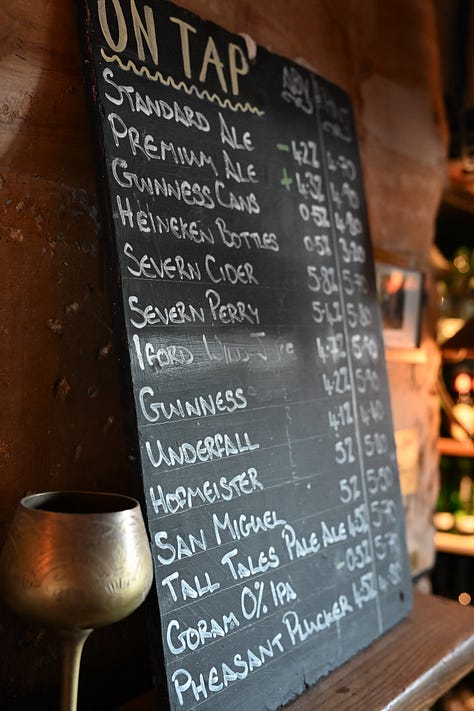
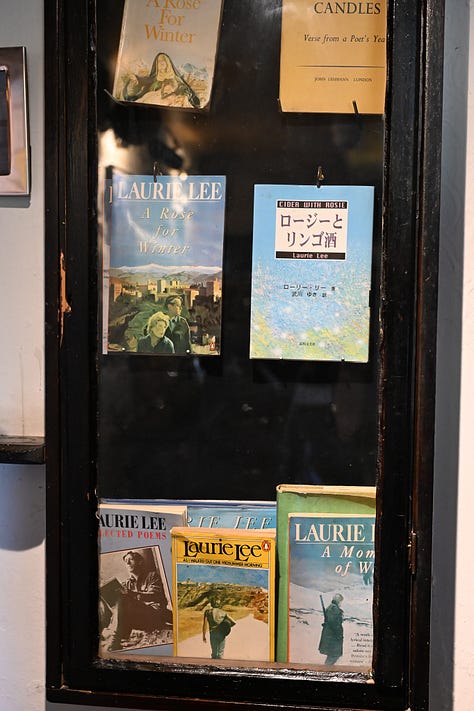

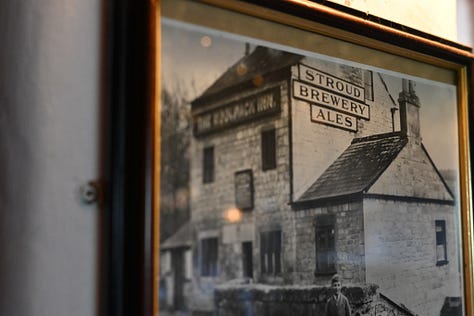
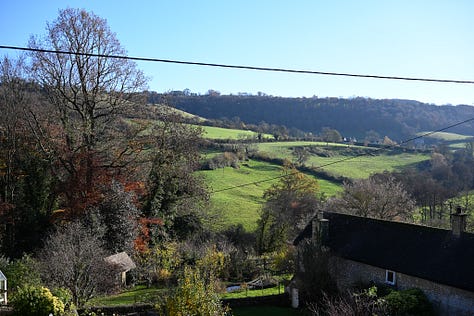
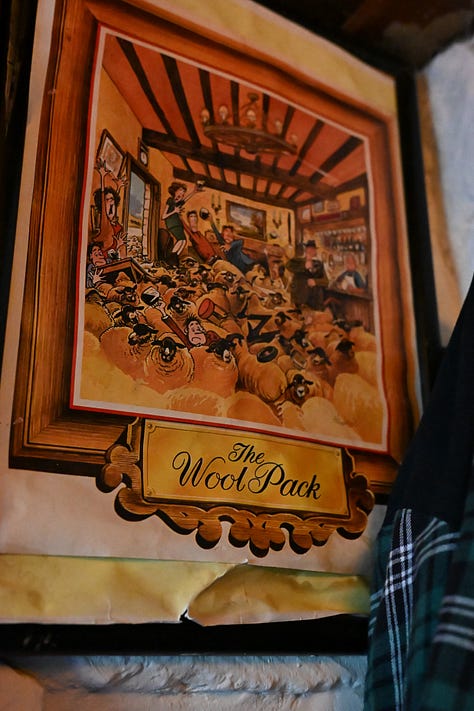


We returned to The Woolpack for some Friday night drinks the next day. The small pub was packed. The wood stove was crackling, the cask ale was being poured (from Stroud Brewery, no less), and laughter was being had. Dan was even there, making the rounds and talking to the regulars.
After a few minutes of standing around with our beer, someone gestured for us to have a seat at their table. Steph and I met Paul and his wife (and their dog, of course), who’ve lived around the corner in Slad for 20-some years.
After a few minutes of classic pub talk, Paul started telling me about the forest conservation group that he's a part of. They care for the village's woods and educate people about proper forest maintenance. Part of their duties include, when necessary, felling some trees.
There's one stipulation, though - they don't use power tools to cut down any of the trees, only hand tools. Why? Well, if you have to use your hands, you'll pause and think carefully about which tree you cut down before you expend all that effort. What happens if I cut down this tree? What about that one? You'll have to evaluate the tree not only by itself, but also in the context of the forest.
After a few pints in a good pub, you start to feel that maybe all the problems in the world aren't so difficult. Maybe there are some solutions out there. Aren’t we all just trees, after all?
It makes sense. Or at least it did in The Woolpack.
- Skylar
P.S. I also met another Paul, a fellow photographer and writer, at The Woolpack. We talked shop for a bit, including our love of pubs. Check out his work on the website or Instagram.





A really enjoyable article about The Woolpack. I’ll be returning some day soon. Thank you for mentioning our chance meeting and also for the links to my website and Instagram. Paul
Best TMT yet!! 🍻🌲